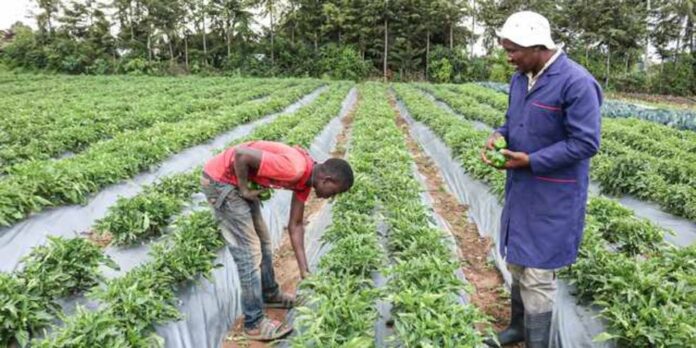Samuel Gachoka Mwaniki is a Nakuru-based farmer who started farming in 2008. On his 5-acre farm that sits in Maragishu village, he grows capsicum, red and white cabbage, onions, spinach, and sukuma wiki.
His farming journey started back in 2008 in Joska Machakos County, where he grew French beans, tomatoes, onions, cabbage, and capsicum on a 20-acre farm.
Mwaniki could not endure the challenge of nematodes, which saw him lose produce worth Sh400,000. Further, he did not have sufficient and clean water for irrigation.
Our secret to getting bumper harvests come rains or dry spells
“I relied on River Athi, whose water is not only heavily polluted but scarce. I feared producing crops that would not be fit for human consumption,” he said.
The heavy financial loss pushed him to take a farming break in 2018 to restructure. He engaged in research, and in the process, he met an Ol Joro Orok-based farmer who was using paper mulch to grow his crops.
Professionally known as plastic mulching, it helps keep crop diseases and pests away. Mwaniki later moved to Naivasha to start his farming afresh, this time around practicing plastic mulching on tomatoes.
He noted that plastic mulching not only helps in controlling pests and diseases but also stops the growth of weeds. It also conserves moisture and has helped Mwaniki thrive in the region where many farmers grow onions as a result of erratic rains.
“The technology is not labor-intensive and reduces production costs by up to 80 percent,” he added.
Easy ways to plant maize for a high harvest
In addition, plastic mulching helps crops to mature faster. Mwaniki says through the technology, he started harvesting capsicum two months after transplanting instead of three months under open soil.
Besides capsicum, strawberry, and tomato, paper mulching is also used in the production of cabbage, spinach, and kale.
Mwaniki says the technology, which can last for two years, has helped him to produce vegetables and fruits organically, adding that it also produces clean produce.
On average, he harvests 500 kilos of capsicum a week, which are destined for local markets such as Naivasha, Nakuru, and Nairobi.
He grows red and white cabbage on two acres, onions on an acre and a half, spinach on an acre, and sukuma wiki on half an acre.
Tomato varieties that will boost your harvest
Plastic Mulch Application
On Mwaniki’s farm, Mulching paper is placed on top of the seedbeds that have manure mixed with lime and topsoil excavated from furrows.
Soil is then spread on the edges along the paths to prevent it from being blown by the wind. Two drip lines are installed under the paper in every bed 1.5ft apart.
Samuel Waikwa, a chemical agronomist, told the Nation that the model is part of conservation agriculture and if it becomes widespread, Kenya will never suffer food scarcity.








